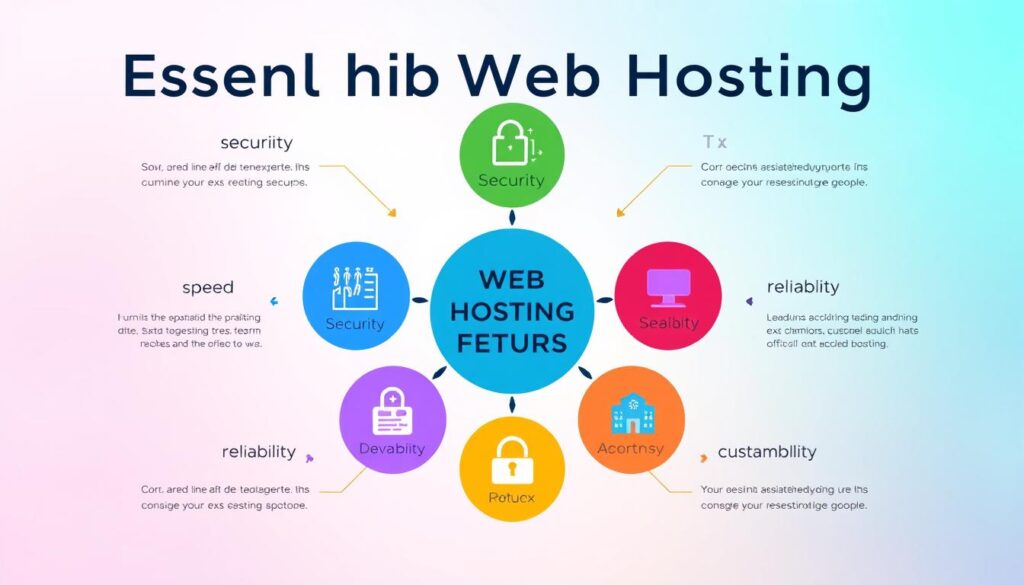In today’s digital world, knowing about web hosting is key for anyone wanting an online presence. Whether it’s a personal blog, a small business, or a big e-commerce site, web hosting is crucial. This complete guide web hosting 2024 will cover the basics and the main differences between hosting options and website builders.
Many people choose to rent space on a server from a trusted web hosting company like GoDaddy or Bluehost. This is often easier than buying your own server. These companies handle tasks like software setup, upkeep, and fixing problems, so you can focus on your content. Their data centers work all day, every day, to keep your site up and running securely.
This guide is for those who might feel lost in the technical side of setting up a website. It aims to make things simpler, helping you pick the right hosting provider and set up your site easily. We’ll cover the web hosting basics to make sure you understand how to host a site well. With the right help, finding your way through the hosting world can be easy, even if you’re new to it.
Key Takeaways
- Web hosting is essential for all websites to be accessible online.
- Most people opt for rented server space due to the high cost of ownership.
- Hosting companies manage installation, maintenance, and support tasks.
- Different types of websites may require specific hosting services.
- Shared hosting is the most affordable option at around $3 to $9 a month.
- Understanding various hosting options can vastly improve user experience.
- WordPress hosting offers tailored features for WordPress sites.
What is Web Hosting?
Web hosting lets people and businesses put their websites online. It stores files like images and videos, making them available worldwide. By getting a web hosting service from places like GoDaddy or Bluehost, your site stays up and runs smoothly.
Choosing the right hosting is key, with many options available. You can pick shared hosting for its affordability or dedicated hosting for more control. Virtual private server (VPS) hosting is a middle ground, offering a dedicated space in a shared server.
Web hosting is more than just server space. It’s about uptime and fast speeds for a good online presence. Aim for 99.9% uptime for businesses that need their sites for sales. The right plan affects how well your site works.
Good customer support, security, and easy site management are also important. Knowing what web hosting is helps you find the best service for your needs.
How Web Hosting Works
When you type a website’s address into your browser, a journey begins. This request travels over the internet to the hosting server. There, the server quickly finds the information and sends it back to your device.
This process is key for anyone wanting to be online. It’s how websites come to life on your screen.
Web hosting companies handle the technical side. They keep servers running smoothly and offer customer support 24/7. This makes it easier for individuals and businesses to have a website without the hassle of managing it themselves.
There are different hosting services for various needs. Shared hosting is cheap and great for small sites. Managed WordPress hosting makes WordPress sites easy to manage.
VPS hosting gives more power for busy sites. Dedicated server hosting offers the most control but costs more. Cloud hosting is best for handling lots of traffic and ensuring fast loading times.
Types of Web Hosting Services
Knowing the different types of web hosting is key for anyone wanting a website. Each type meets various needs and budgets. It’s important to pick the right one based on your specific needs. Let’s explore the main types of web hosting services available today.
Shared Hosting
Shared hosting is a top choice, making up 42.5% of the global market. It lets many websites share the same server, making it affordable for individuals and small businesses. It’s great for beginners, costing less than $10 a month. However, it can be slow and have issues during busy times.
VPS Hosting
VPS hosting is a good middle ground between cost and performance. It uses virtualization to split a server into many virtual ones. This plan, priced from $30 a month for managed solutions, offers better performance and customization. It’s a good choice for those who need more than shared hosting but can’t afford a dedicated server.
Dedicated Server Hosting
Dedicated server hosting gives you top performance and control. You get the whole server to yourself. It’s pricier, with basic plans from $80 to $100 a month. Advanced plans can cost thousands. It’s best for businesses with lots of traffic or strict security needs.
Cloud Hosting
Cloud hosting is a game-changer, offering flexibility, scalability, and security. It uses many servers to balance resources and speed. Businesses can scale up or down as needed, only paying for what they use. It’s popular for its reliability and disaster recovery options.
| Type of Hosting | Market Share | Average Cost/Month | Best For |
|---|---|---|---|
| Shared Hosting | 42.5% | Under $10 | Individuals & small businesses |
| VPS Hosting | N/A | $30+ | Growing websites needing better performance |
| Dedicated Server Hosting | N/A | $80 to $100+ | Large businesses with high traffic |
| Cloud Hosting | N/A | Varies | Organizations needing flexibility & scalability |
Understanding Web Hosting: Your Complete Guide for 2024
Knowing about web hosting is key for anyone with a website. This guide covers the basics of hosting, helping you make your site run smoothly. As we look to 2024, it’s important to understand the different types of hosting and their benefits.
Choosing the right hosting can make a big difference. Shared hosting is popular and cheap, great for small sites or blogs. But, it might not grow with your site’s needs.
VPS hosting is a better choice for growing businesses. It offers more control and better performance. Prices range from $30 to $100 a month, reflecting its value.
Managed hosting is perfect for those who want to focus on other things. It’s especially good for WordPress users, with prices from a few dollars to $30 a month. It’s a great option for those who value ease and security.
Cloud hosting is another top choice, known for its fast and reliable performance. Prices vary from $10 to $100 a month, making it scalable for growing sites. For sites with lots of traffic, dedicated hosting is the best. It offers customizable servers, starting at $100 a month. It’s perfect for big eCommerce sites or busy news outlets.
Each hosting type has its own strengths, as shown in current web hosting insights. Understanding these differences is crucial for making the most of the latest trends in 2024 and beyond.
Choosing the Best Web Hosting Provider
Choosing the right web hosting provider is key to your website’s success. Many factors come into play, so it’s important to know what you need. Here are some key things to consider.
Factors to Consider
- Hosting Type: Think about what you need. Shared hosting is good for small sites and is affordable. VPS and dedicated hosting are better for growing businesses.
- Cost: Look at your budget and what each provider offers. HostPapa and Bluehost start at $3 a month, great for beginners.
- Essential Features: Make sure they offer free SSL certificates, DDoS protection, and help with moving your site. SiteGround starts at $3 a month and offers big discounts.
- Customer Support: Good customer support is vital. GoDaddy offers 24/7 support for $6 a month, so you’re never alone.
- Reputation: Check the provider’s reputation. A2 Hosting and InMotion Web Hosting are known for their great service and uptime.
Popular Hosting Providers
Here’s a look at some top hosting providers and what they offer:
| Web Hosting Provider | Starting Price per Month | Key Features | Best For |
|---|---|---|---|
| HostPapa | $3 | Free SSL, DDoS protection, 24/7 support | Beginners |
| Bluehost | $3 | Two-factor authentication, anti-spam protection | WordPress hosting |
| SiteGround | $3 | Great initial pricing, excellent customer support | Value seekers |
| GoDaddy | $6 | 24/7 customer support | Performance focused |
| Hostwinds | $5.24 | Unlimited storage and bandwidth | Growing websites |
Features You Need in Web Hosting
Choosing the right web hosting is key. It affects your website’s performance, security, and how users experience it. We’ll look at important features like uptime, security, and customer support.
Uptime and Reliability
Uptime is crucial when picking a host. Look for a host that promises at least a 99.99% uptime. This ensures your site is always up and running. Downtime can hurt your business and reputation.
Providers like Bluehost and HostGator offer strong uptime guarantees. This gives you confidence in your site’s availability.
Security Measures
Web hosting security is vital to protect your data and users’ information. Your host should offer free SSL certificates, regular backups, and malware scans. Many hosts, like those for HIPAA-compliant data, have specialized security solutions.
Knowing about security protocols helps keep your site safe from threats.
Customer Support
Good customer support is essential for a smooth website experience. Choose a host with a responsive support team. Look for various support channels like live chat, email, and phone.
Hosts like Hostinger and TMDHosting are known for their excellent support. They make sure help is always just a message away.

| Hosting Provider | Uptime Guarantee | Starting Price (Per Month) | Security Features | Support Options |
|---|---|---|---|---|
| Bluehost | 99.99% | $1.99 | Free SSL, Daily Backups | Live Chat, Phone, Email |
| HostGator | 99.9% | $2.75 | Free SSL, Malware Scanning | Live Chat, Phone, Ticket Support |
| Hostinger | 99.9% | $2.69 | Free SSL, Weekly Backups | Live Chat, Email |
| TMDHosting | 99.99% | $2.95 | Free SSL, Daily Backups | Live Chat, Phone, Ticket Support |
Setting Up Your Hosting Account
Setting up a hosting account might seem hard at first. But, once you understand it, it’s easier to start your online journey. Start with domain registration to pick a unique name for your site. Sites like Namecheap and Google Domains make this easy, working well with your hosting.
After getting your domain, focus on setting up your web hosting account. Choose a provider that fits your needs. Bluehost offers plans starting at $1.99 a month, with lots of features. Hostinger’s plans start at $2.69 a month, with discounts and free stuff like domains and SSL certificates.
When you pick a provider and plan, make your account. Many hosts, like HostGator and Web.com, have easy interfaces. They offer free SSL certificates and help moving your site, often at a low cost.
Then, set up your account settings. Changing your DNS settings is key to linking your domain to the hosting server. This might take a few hours to show up everywhere. Top hosts also offer a free one-click WordPress install, making it easy to connect your domain and hosting.
In short, starting a hosting account means getting a domain, picking a host, and setting up your account. Knowing these steps is the first step to a strong online presence.
| Hosting Provider | Starting Price | Included Features |
|---|---|---|
| Bluehost | $1.99/month | Unmetered bandwidth, SSD storage, free domain |
| Hostinger | $2.69/month | Free domain, email, Unlimited SSL, 10% discount with code FORBES10 |
| HostGator | $2.75/month | Free SSL certificate, website transfer, 30-day money-back guarantee |
| Web.com | $2.75/month | Website building services, customizable templates, included SSL certificate |
Optimizing Your Website Performance
To make your website better, you can try several things. Making your website load faster is key. Slow sites can lose users fast. A study found that 53% of mobile users leave if a site loads too slowly.
One important tactic is image optimization. Smaller images mean faster loading times without losing quality. Also, using caching keeps files on your device, making them load quicker. This makes your site faster and keeps users interested.
Using a Content Delivery Network (CDN) also helps a lot. CDNs spread your content across servers worldwide. This cuts down on how far data has to travel, making your site load faster and handle more visitors.
Another good idea is to use fewer plugins. Too many plugins can slow your site down. Cutting out plugins you don’t need makes your site faster and more efficient. Check your site regularly to find and remove unnecessary plugins.
It’s also important to watch your site’s performance. Look at page load time, time to first byte (TTFB), and interactive time. Use tools like Google PageSpeed Insights and GTmetrix to check these. Keeping your site fast is crucial, as Google suggests it should load in under two seconds for the best user experience.

Conclusion
In this web hosting conclusion, we’ve covered key topics for making smart hosting choices. Whether you’re a small business or a big company, picking the right hosting is crucial. It’s important to match your hosting plan with your needs, like website growth and technical support.
This guide highlights the importance of uptime, security, and support in today’s digital world. With cloud hosting and WordPress optimization on the rise, you’ll see better flexibility and uptime. As your site grows, so will your hosting needs.
As you plan for the future of web hosting, use what you’ve learned to find the perfect provider. Look at different options and choose plans with extra perks like SSL certificates or 24/7 support. The right choice will help your website thrive and keep you ready for the web’s changes.


